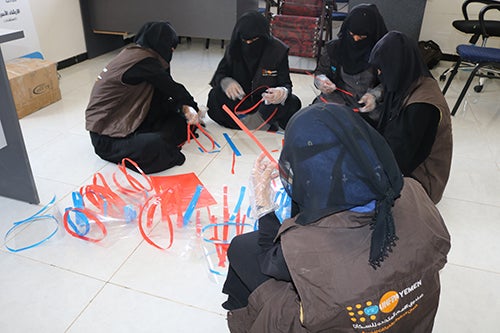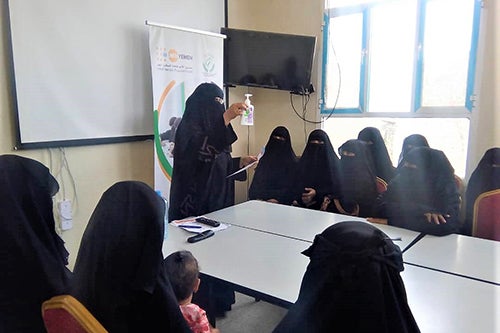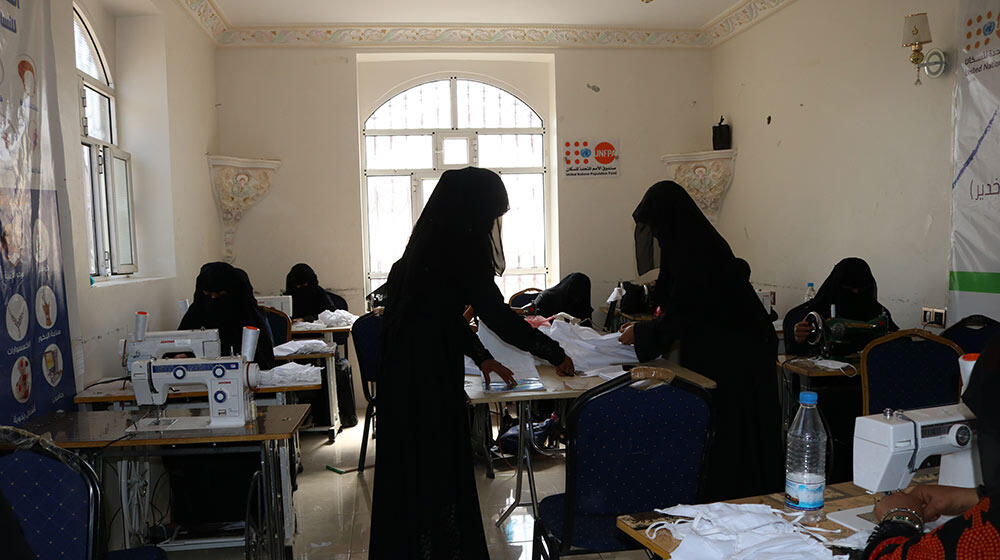SANA’A, Yemen – Salwa, 35, has survived child marriage, three abusive husbands, crushing poverty and years of grinding conflict. After the onset of the COVID-19 pandemic, she also endured starvation. But now, only months after joining a women’s safe space and learning to sew, she is building a new life for herself.
Salwa’s hardships began when she was married off at age 12. Her husband mistreated her for years, and then abandoned her, taking their daughter with him.
As a woman, it was not considered acceptable for Salwa to live alone, so she moved in with her brother. He quickly arranged for her to marry another man – a stranger who also abused her.
“I was not able to take more, so I asked for a divorce,” she explained. Months later, her brother married her off again. Salwa’s third husband was also violent. “I used to cry constantly,” she said.
When the outbreak of COVID-19 led businesses to close their doors, her husband stopped working. Their debts accumulated. Then one day, he simply left.
Salwa had no income and no food.
“I was staying without food for days,” she said. “I wanted anything to eat. Sometimes, some neighbours were giving me some food.”

“Stitching my torn life”
Finally, members of Salwa’s community – part of a “protection committee” – told her about a safe space established by UNFPA and the Yemeni Women’s Union. The space provides counselling, vocational courses, literacy classes and other services for women and girls.
“Signs of fatigue and illness were visible in her features and even in the way she spoke,” said Fawzia, a psychologist who met with Salwa.
Together, they created a plan to help Salwa gain control of her life.
She began receiving regular health and psychosocial services. She attended training courses, learning about marketing and project management. And she discovered a talent for sewing.
“When I stitch, I imagine that I am stitching my torn life,” she said. “I give all my best when I sew because it makes me feel extraordinarily happy, which makes me forget all the difficult days I went through.”
Salwa qualified for an economic empowerment grant, which helped her start her own sewing business.
Today, Salwa works in a spinning and weaving factory, and also takes on sewing projects at home. Many of her clients have asked her to make face masks to help prevent the spread of COVID-19.
“I am able to support myself, and I do not need help from people,” she told UNFPA. “I sew at home and produce 300 masks a week."
UNFPA’s response under threat
Safe spaces offer critical services for women and girls amid the conflict, pandemic and economic devastation seen in Yemen today. These spaces serve some of the most vulnerable, including displaced women and girls.

A number of safe spaces have had to scale down operations due to the pandemic. Today, 42 safe spaces are currently operational, working with funding from Denmark, Iceland, Japan, Netherlands, Norway, Sweden and Switzerland.
They are playing a vital role in raising awareness of coronavirus prevention measures. Many continue providing services through telecounselling, hotlines and other platforms. And since April 2020, volunteers in the safe spaces have produced more than 50,000 face masks for distribution in vulnerable communities.
But funding for these safe spaces, and for UNFPA’s reproductive health support, is running dry.
In 2020, UNFPA appealed for $100.5 million to reach 4.1 million Yemeni women and girls with life-saving services, but only 53 per cent of the needed funds have been mobilized to date. Like other humanitarian agencies, UNFPA has been forced to scale down operations.
In May, support was suspended to 140 of the 180 UNFPA-supported health facilities. If this funding trajectory continues, UNFPA will be forced to suspend operations further. The closure of safe spaces and protection services could affect over 350,000 women and girls.
To keep reaching the most vulnerable women and girls through the end of the year, UNFPA requires $43 million, with an additional $20 million to respond to the COVID-19 pandemic.


